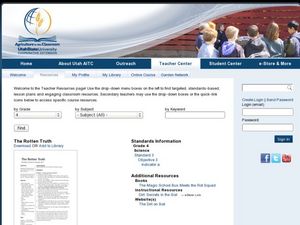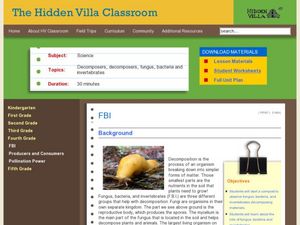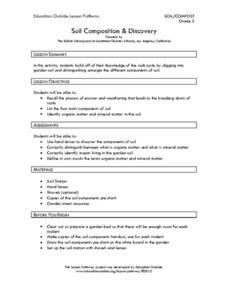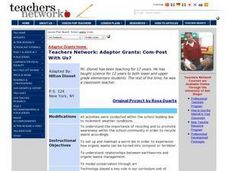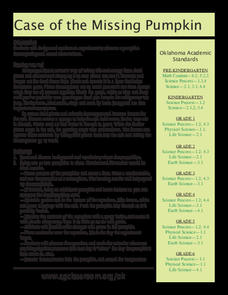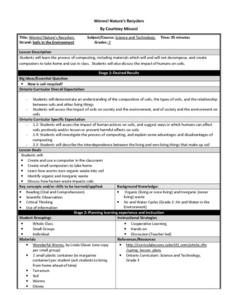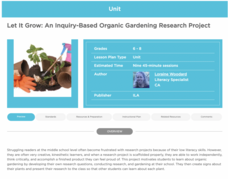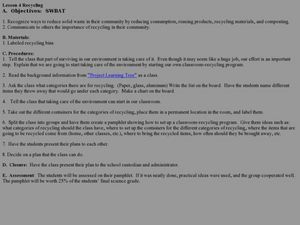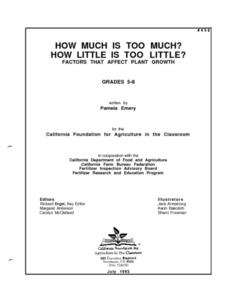Curated OER
Red Wigglers
Students are introduced to the benefits of using Red Wiggler worms to produce compost. They identify the requirements for the worms and the methods to follow in order to produce compost. They draw a picture of a functioning worm bin.
Curated OER
Recyclers Revisited
Fifth graders observe their plant experiments that they started in a previous lesson and examine the role of decomposers in the nitrogen cycle. Two weeks after they set up a worm terrarium, they analyze any changes they observe, and...
Curated OER
The Rotten Truth
Fourth graders investigate compost. In this Science lesson, 4th graders take notes on the components of soil and its relation to plant growth. Students describe the steps in making compost.
Curated OER
Vermiculture Food Waste Compost Program for Touchstone School
Young scholars explore the advantages of composting. In this recycling lesson students complete a worm compost project and collect food waste to feed them.
Curated OER
FBI
Fourth graders experiment with compost. In this Science lesson, 4th graders begin a worm compost as well as an outdoor compost. Students discuss decomposition.
Curated OER
Organic and Inorganic Waste
Students conduct a scientific investigation about organic or inorganic waste. In this organic or inorganic waste lesson, students create a compost heap to determine the difference between inorganic and organic waste. Students record...
Education Outside
Soil Composition & Discovery
Organic or mineral? How does the matter matter? Second graders use their knowledge of the rock cycle to label the different components in garden soil.
Curated OER
Decomposers at Work!
Learners design and conduct investigations that illustrate the process of decomposition. After a lecture/demo, students simulate the process of soil composting in the classroom. They closely chart the decomposition of their soil.
Curated OER
Com-Post With Us?
Students discuss the importance of reducing, recycling and reusing materials to help the environment. As a class, they create a worm bin and observe how it turns material in to compost. They use the internet to research the...
Curated OER
Vermicomposting
Fourth graders explore insect life by viewing a soil presentation in class. In this composting lesson, 4th graders read assigned text about the process of composting soil and the necessity of soil in plant life. Students view video clips...
Curated OER
"Leaf" It in Your Yard
Students research about the process of composting. Students apply their research by creating a compost pile at school that will be maintained once or twice a month for the remainder of the school year.
Curated OER
Case of the Missing Pumpkin
Scientists define and discuss decomposition, and watch pumpkins decompose and return to soil in classroom experiment. They record the date the experiment began, chart changes in pumpkins on a calendar, count how many days it takes...
Cornell University
Fibers, Dyes, and the Environment
Nanofibers can be made through electrospinning or force spinning in order to reduce the negative impact on the environment. Pupils study the role of fibers and dye on the environment through a series of five hands-on activities. Then,...
Cal Recycle
Conserving Natural Resources
Trying to plan an engaging elementary science unit on natural resources? Conserve your energy! This five-part series of lessons and hands-on activities has exactly what you need to teach young scholars about the importance of conservation.
Curated OER
Investigating the Response of Worms to Soil Improvers
The worms crawl in, the worms crawl out, but do they care what soil is all about? Find out in an easy and fun controlled experiment. Have your young biologists hypothesize, test, and draw conclusions about which type of soil worms...
Curated OER
Worms, Nature's Recyclers!
Students study what worms need to survive in different environments. They study how worm composting improves soil and reduce waste. They discuss composting techniques and present a puppet show about a worm's life.
Curated OER
Solid Waste Recycling
Learners plan a "no garbage" lunch and hold a classroom contest to sort grabage into what can and what can't be recycled. They assess the importance of reducing the amount of garbage in the environment and set up a book recycling program.
Curated OER
Making Your Own Sampling Tools
Students examine cause-and-effect relationship between human attitudes and behavior in the environment. They also assist citizens in increasing their sensitivity and stewardship for the environment.
ReadWriteThink
Let It Grow: An Inquiry-Based Organic Gardening Research Project
How does your garden grow? An inquiry-based, organic gardening unit asks young scientists to research a vegetable or flower, create an environment for it, and then plant and tend to the seedling. Gardeners develop their own research...
Curated OER
Causal Patterns in Ecosystems Section 3
Students design and create a worm and worm free compost tanks for observation of decay in ecosystems. They make predictions, care, and revist tanks using their journals for observation and data collection.
Curated OER
Can Worms See?
Second graders discuss the previously created worm compost and the importance of living creatures to the Environment. In this worm lesson, 2nd graders observe worms and record their sensitivity to light. Students design a petri dish...
Curated OER
Recycling: lesson 4
Students create plans in order to reduce solid waste. For this recycling lesson plan, students discuss and come up with plans to reduce consumption, reusing products, recycling materials, and composting and then present their plans to...
Curated OER
How Much Is Too Much? How Little Is Too Little?
Students perform a series of experiments which show that plants require nutrients in certain quantities. They also cooperatively read materials on the nutrient requirements of plants, fertilizers, composting, and soil management, and...
Curated OER
Gardening with Your Students
By growing a class or school garden you can teach students about the environment, the life cycle of a plant, and healthy eating.




